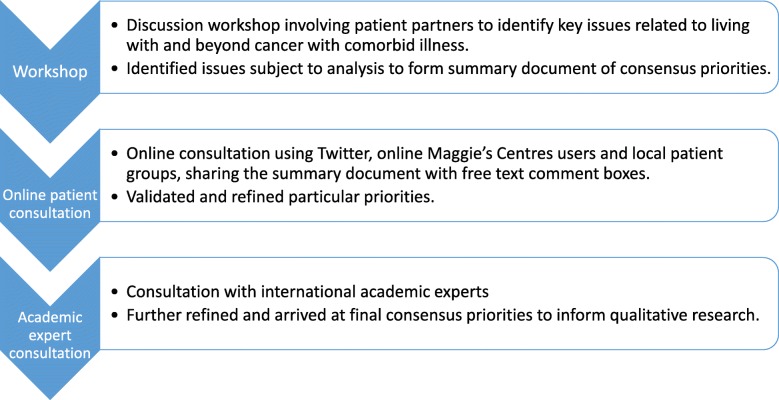People living with and beyond cancer usually tend to have comorbid circumstances and poorer psychological and bodily well being, however there may be a dearth of in-depth research exploring the psychosocial wants of individuals experiencing cancer and comorbid continual circumstances.
A affected person partnership strategy to research prioritisation and planning can guarantee outcomes significant to these affected and can inform coverage and apply accordingly, however will be difficult.We aimed to tell priorities for qualitative inquiry into the experiences and assist wants of individuals living with and beyond cancer with comorbid sickness utilizing a partnership strategy. A 3-step course of together with a affected person workshop to develop a session doc, on-line session with sufferers, and educational skilled session was carried out.
The research prioritisation course of was additionally appraised and mirrored upon.Six folks attended the workshop, ten responded on-line and eight educational consultants commented on the session doc. Five key priorities have been recognized for exploration in subsequent qualitative research, together with the diagnostic journey, the burden of signs, managing medicines, addressing the wants of casual carers, and service provision.
Limitations of affected person involvement and reflections on procedural ethics, and the problem of constructing measurable variations to affected person outcomes have been mentioned.Findings from this research prioritisation train will inform deliberate qualitative work to discover sufferers’ experiences of living with and beyond cancer with comorbid sickness.
Including affected person companions in the research prioritisation course of provides focus and relevance, and feeds into future work and suggestions to enhance well being and social care for this group of sufferers. Reflections on the session course of contribute to a broadening of understanding the subject of affected person involvement.

Punjabi model of the European Organization for Research and Treatment of Cancer Quality of Life Questionnaire-OES 18 and Quality of Life Questionnaire-OG25 modules for high quality of life evaluation.
Health-related high quality of life (HRQOL) evaluation performs an necessary position in the decision-making course of in oncology.The goal of the research was to translate European Organization for Research and Treatment of Cancer (EORTC) high quality of life questionnaire (QLQ) OES18 and OG25 in Punjabi language for HRQOL evaluation of sufferers identified with esophagus and esophagogastric malignancies.
The EORTC translation tips have been duly adopted to translate QLQ-OES18 and OG25 into Punjabi language. Each set of questionnaire was independently translated by two ahead translators, adopted by backward translation of the reconciled model by two impartial translators.
The remaining model was submitted to the EORTC Translation Team and served to the sufferers for the pilot testing.The questionnaire was administered to 10 sufferers every of esophagus and esophagogastric malignancies who have been evaluated and handled at our hospital. Every affected person underwent an interview to verify if any of the questions was troublesome, uncomfortable, or upsetting to reply. Their issues have been recorded as per the template offered by the EORTC workforce and due adjustments accomplished if required.The EORTC QLQ-OES18 and OG25 questionnaire has been translated to Punjabi language and subsequently accepted for utilization.